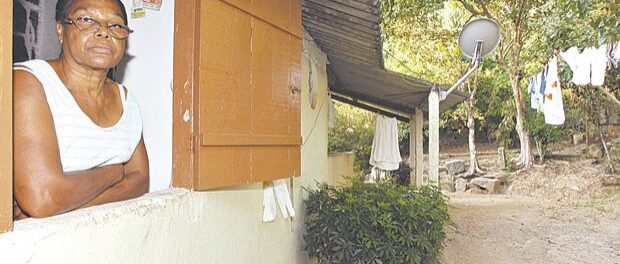
For the original in Portuguese by Lucas Gayoso, published in O Dia, click here.
Vale Encantado is at risk of removal, due to legal action that has been going on for ten years.
RIO-In Alto da Boa Vista, in the heart of the Tijuca Forest, sits Vale Encantado (“Enchanted Valley”). Despite the fairytale name, the community is not sleeping peacefully. The hundred-year-old favela is at risk of removal, due to a legal action that has been ongoing for ten years. While the community organizes sustainable projects, residents are living through the drama of potentially losing their houses and, along with them, the history of the generations that grew up there.
The two signposts at the entrance to the area show the space is home to more than one enchanted valley. The first sign points in the direction of a middle-class condominium which takes up a significant amount of space in the area. The second sign, with peeling paint, indicates Vale Encantado and the residents of the favela’s forty-odd houses spread out in the forest. This is where our reporting team is headed.
The two neighborhoods—the condominium and the favela—share a coveted view of the beach of Barra da Tijuca. Pointing towards the horizon, community guide Otávio Barros, 45, shows the way through the forest. “There are a lot more people living in the condominium and it’s also in a bad state. But what’s intriguing is that it’s just our community that is being targeted,” he says. “They cite the disorganized growth of the community as one of the reasons for eviction. But the community doesn’t even have space to expand. I don’t understand what’s behind this,” he questions.
Fulfilling his role as guide, Otávio points out the different species of plants in the region. In some places, the seeds from the paineira trees look like a layer of cotton on the ground. The fairytale scene contrasts strongly with the burnt-out broken van lying nearby. “Drug traffickers in the hillside communities around here use this area to dump things. We’ve asked the city cleaning company to come and clear the area but no one comes. I have to explain this so those who come to visit don’t get a bad impression.”
Even though the legal process has been ongoing for ten years, Otávio maintains that many of the long-time residents are suffering from the tension of potentially losing their homes. This is the case for Adenir dos Santos, 71, the Dona Deni. Sharing a small house with her daughter-in-law and granddaughter, she spends the day looking after the vegetable patch and sweeping flowers from the yard. “This is a good little place to live. We were born and raised here,” she says. “But we’ve been losing sleep for ten years. I had health problems before all this began, but now I only leave the house to go to the doctor. We’ve lost our sense of peace.”
According to Otávio, the Vale Encantado Residents’ Association was told that an environmental expert from the Public Prosecutor’s Office would come and visit the area in the coming months, to see if the community was causing environmental damage to the area. “We’re distrustful. This is not a vote-winning place, like communities the size of Rocinha are. We don’t have a voice,” he claims.
The press office of the Public Prosecutor’s Office would not give any clarification on this matter. According to the Municipal Housing Secretariat, there are no current housing projects planned for the area.
French NGO promotes projects and a festival
Since 2006, the Vale Encantado Cooperative [correction from original article] has been running over 15 eco-projects in the community, including studying water resources, installing a biodigester, working out a system for sustainably managing sewerage from the community and the nearby condos (in collaboration with PUC, the Catholic University) and the creation of an organic community garden.
In 2013, the French NGO Abaquar Paris promoted the Enchanted Festival, a benefit for the community’s sustainability initiatives, with the participation of international artists and the Brazilian musician Criolo. The event was designed to raise awareness about the community, and included fashion and food inspired by the region. Jérôme Auriac, the director of the NGO, said that a new format for the festival is being developed and will be released soon.
“Abaquar’s projects are designed to develop the Vale Encantado residents’ (including children) capacity to develop projects which are both sustainable and income-producing,” says Jérôme. “The city government’s role is to make sure that favelas are real districts and neighborhoods of the city—not to do the opposite and remove them.”
History
The Vale Encantado region began to be occupied during the Coffee Boom of the 19th Century, when plantation workers brought their families to live there.
In the 1950s, mining for granite (abundant in the area) became a big trade. The quarry was closed in 1989, for ecological reasons, and many workers left the area.
“Many women who relied on their husbands’ work in the granite trade were left without income. The idea is to help them get involved in cooperative work, such as food preparation,” says community leader Otávio.
In search of alternatives
As well as Vale Encantado, 11 small communities in the forest area are under threat. They include: João Lagoa, Soberbo, Caminho Santo André, Açude, Redentor and Furnas 866. The communities are represented by the Alto da Boa Vista Citizens’ Council, which is led by Otávio. “We got organized in order to improve our neighborhood. I believe that environmental tourism is a good option, in order to help these communities become sustainable,” he says.
With proceeds from last year’s Festival and support from an architecture project at PUC university, a headquarters for the Residents’ Association is being built. Otávio runs a guided tour through the community for anyone interested. After the tour visitors can enjoy a lunch prepared with fruits local to the region. The price of the visit is R$60 (US$18).

